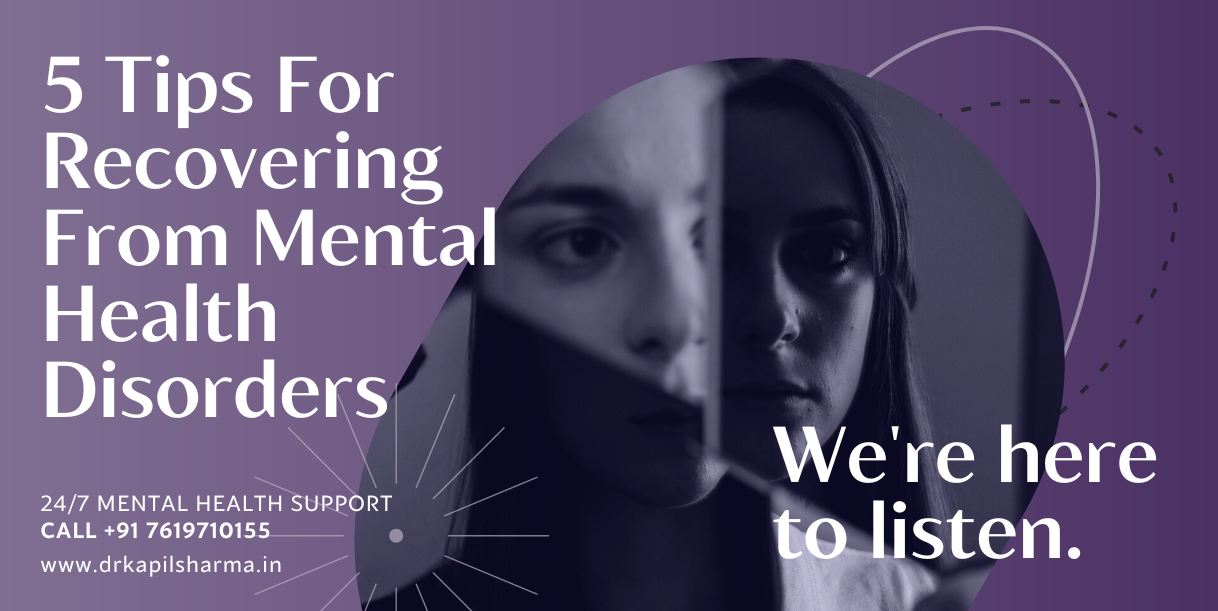
5 Tips For Recovering From Mental Health Disorders
Mental Health Disorders are something that many face in their lives, whether it be anxiety and depression or postpartum depression and schizophrenia. They can cause a great deal of emotional upheaval and emotional pain and require a great amount of time to recover from. These tips won’t cure you or make your mental health disorders go away, but they will help you learn how to overcome them.
What mental health disorders are there?
There are different types of mental health disorders, each with its own symptoms and ways of getting treated.
Mental health disorders can be broadly classified into three categories: anxiety disorders, mood disorders, and substance use disorders.
Anxiety disorders are the most common type of mental health disorder. They include panic disorder, generalised anxiety disorder, and obsessive-compulsive disorder. People with these disorders experience intense anxiety or worry over a long period of time.
Mood Disorders are a type of anxiety disorder that affects an individual’s mood. Mood Disorders include major depressive disorder, bipolar disorder, and post-traumatic stress disorder. People with these disorders have a change in their mood that is not attributable to external factors like stress or joy.
Substance use disorders are a type of mental health disorder that involves using drugs or alcohol in an uncontrolled way. This can lead to problems like addiction, dependence, and abuse.
Symptoms of mental health disorders
Mental health disorders can be very difficult to deal with. If you or someone you know is struggling with a mental health disorder, there are some things you can do to help Recovery.
The first step is to get rid of any self-imposed barriers. This means breaking down the barriers that are holding you back from trying new things, meeting new people, and expressing your feelings. This can be a difficult process, but it is important.
Another important step is to talk about your mental health disorder with somebody who will understand and support you. Talking openly about your struggles will help you feel less alone and more able to cope with them.
Finally, make sure to get enough rest and exercise. Both of these things have been shown to improve mental health outcomes in general and specifically for people who are struggling with mental health disorders.
How to get help for a mental health disorder
If you are feeling overwhelmed or struggling with a mental health disorder, there is help available. You don’t have to suffer alone. You can consult with the best psychiatrist in Jaipur if you belong to Jaipur.
The first step is to get help from a professional. There are many qualified professionals who can offer you assistance. You may want to consider seeing a therapist, counselor, or psychiatrist. These professionals can help you explore your feelings and learn how to cope with them.
If you don’t feel like talking to a professional, there are other resources available. You can talk to friends or family members about your mental health disorder. You can also seek out support groups for people with mental health disorders. These groups can provide you with valuable support and advice.
Recovering from a mental health disorder
If you are struggling with a mental health disorder, there is hope. There is help available, and you can recover. The first step is to recognize that you have a problem and need help. Here are some tips to help you get started:
1) Talk to someone. It’s important to talk about your feelings and experiences with someone who will listen without judgment. Talking with a trusted friend, family member, or therapist can be very helpful in recovering from a mental health disorder.
2) Seek professional help. If talking isn’t helping, professional help may be what you need. A therapist can provide support and guidance during your recovery process. They can also refer you to other resources, such as therapy groups or medication therapy.
3) Find therapies that are right for you. There are many different types of therapies available to people with mental health disorders. Some therapies focus on cognitive restructuring, which helps patients understand their thoughts and beliefs about themselves and their relationships with others. Other therapies focus on emotional regulation techniques, such as breathing exercises or yoga. You’ll find the perfect therapy for you if you explore options carefully and speak with several therapists before making a decision.
Recovering from a mental health disorder is a process, not a single event. You will experience symptoms throughout life — sometimes for years or even decades. Once you learn to recognize these symptoms and the triggers that cause them, you can begin to take steps to recover.
Conclusion
Mental health disorders can be incredibly challenging to manage, and they can take a toll on your mental, physical, and emotional health. If you or someone you know is struggling with a mental health disorder, there are some tips that may help improve your recovery process. By following these simple steps, you may be able to regain control over your life and move forward in a more positive direction.

